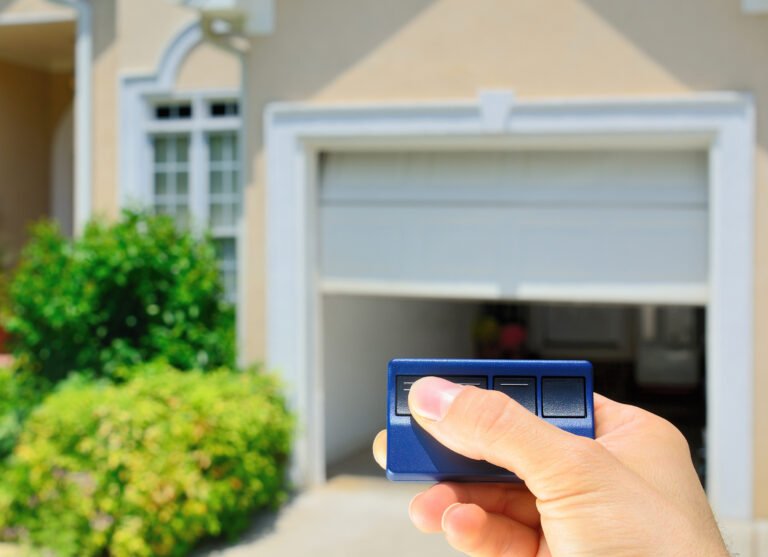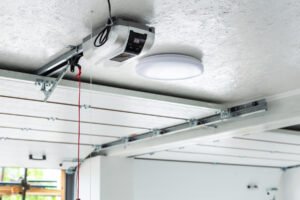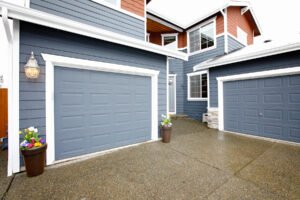I’m sure you spend big bucks on your home security. You might add an electric doorbell and alarm system, but did you safeguard the most vulnerable break-in point—your garage?
Securing a garage door is crucial to protecting your cars and expensive tools from theft and preventing trespassers from accessing adjacent rooms. So, choosing the right door lock becomes vital! To help you, I’ll explain 7 different types of garage doors and their pros and cons so you can choose the best one for your garage!
A List of Popular Garage Door Locks That Enhance the Garage Security
Garage door locks come with different operations; each has a different bolting system and suits different garage door types and openers. So, let’s understand how garage door locks work, their pros and cons, other crucial aspects, and some tips to help you find the best garage door lock for your doors.
1. Automatic Door Locks
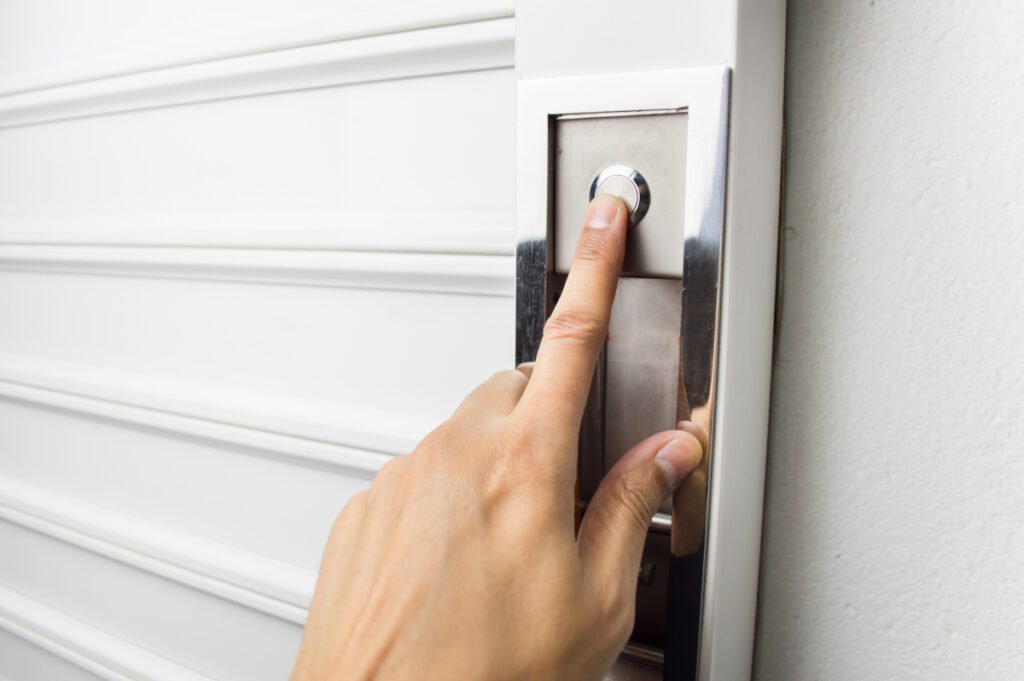
An automatic garage door lock is a smart lock with an interlocking electromagnetic plate that bolts the door automatically when closed. Moreover, these keyless locks have a unique entry code or password and cannot be force-stopped or hacked.
Further, these can be extended to your home alarm system’s sensors to keep track of activities and intrusions.
However, an automatic garage door lock is exceptionally tricky to install and has lots of wiring that need proper connections and a power supply to work well. Hence, you’ll always require a professional electrician or technician to install these.
Best For: Suitable for a modern roll-up, overhead, tilt-up, and automated shutters.
| Average Cost | $100 – $150 |
| Prominent Material | Galvanized Steel or Powder Coated Metal |
Pros:
- Operates at the click of a button.
- Has a unique entry code for added security.
- Sends notifications if someone opens the garage door.
Cons:
- Expensive and Difficult to install.
- It is not compatible with traditional hinged doors and sliding doors.
- Requires heavy maintenance and professional help.
Use a wireless system to connect your garage lock to the sensor, thus preventing complicated or hanging wiring and enhancing its efficiency.
2. Slide Lock
Slide locks have a simple mechanism that uses a latch that slides from the door into a pre-cut hole in the garage door track, preventing it from ascending when bolted. These locks are simple, cost-effective, easy to install, and adapt to various door materials.
Plus, they are installed from the door’s inside face, making them challenging to break or damage.
However, a slide lock suits manual-operated doors and might burn the motor or bend the shutters in automatic garage doors. Similarly, the lock cannot function properly if you have modern, rectangular slug template tracks, and you’ll need to replace those with hollow, 2-inch channels that allow the slide lock to pass through them.
Best For: Metal garage doors or an Overhead Door with an Electric Garage Door Opener.
| Average Cost | $10 – $25 |
| Prominent Material | Galvanized Steel with Chrome Finish |
Pros:
- Easy to Install and more Cost-effective.
- You can add a secondary padlock with it for double security.
Cons:
- It’s not automated and needs manual Push/Pull.
- You cannot access or operate the lock from outside your garage.
- Malfunctions and damages the shutter if installed with an automatic garage door opener.
You can add a simple screw bolt to the base of the latch to prevent door openers from malfunctioning and stressing the slide lock.
3. T-Handle Garage Lock
A T-handle lock has a simple pulley and cable system that locks and unlocks the latch based on the rotation of the T-pulley. When rotated anti-clockwise, the high-tension mechanism and spring-loaded bolts pull back the cables and raise, slide, and open the door. On a clockwise rotation, the cables push the bolts back into the latch and lock the door.
These locks can be installed on either side of the garage doors, just like a dead-bolt system for double security. Moreover, each T handle lock has a separate key and cannot be operated with other unlocking devices.
Best For: Thick wooden garage doors, Sectional garage doors, or an Overhead garage door with a garage door defender.
| Average Cost | $30 – $40 |
| Prominent Material | Chrome or Anodized Metal |
Pros:
- Easy to install, fit, and use.
- Each has a unique key that boosts the overall security.
- Sturdy and affordable.
Cons:
- Not suitable for hinged garage doors.
- Easily breakable; thus, it needs to be installed from the inside of the door frame.
- Cannot work with automated openers and requires a manual lock.
Always orient the back locking and securing mechanism in the same direction as your lock turns for smooth movement and a stress-free locking mechanism.
4. Central Garage Door Locks
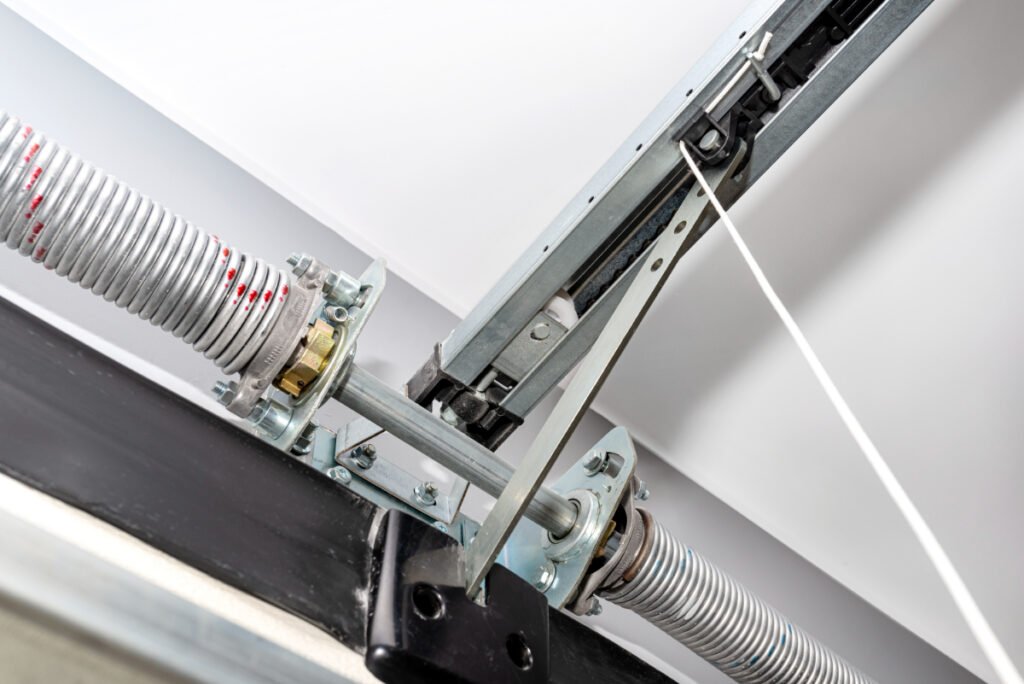
A central garage lock sits at the center of your garage door and manages all the cables and pressure springs that run from the locking mechanism to the actual bolt.
These types of locks have an equalizer that releases the tension springs, loosens the cables, pulls back the bolt to open the door, tightens the springs, and anchors the bolt while closing the door.
Best For: An overhead garage door and roll-up door.
| Average Cost | $40 – $50 |
| Prominent Material | Zinc or Stainless Steel |
Pros:
- Easy to Install, Operate and Maintain.
- Evenly Balanced.
- Provides a locking system to both ends of the garage door.
Cons:
- Not very convenient and Requires manual work.
- Has hanging cables that might snap during any garage door repair work.
- Cannot be operated with the garage door remote.
Lubricate these locks with a dry lube such as Teflon or Graphite to repel dirt, reduce friction, and eliminate the cranky noise.
5. Electronic Locks
Best For: An electric garage door, sectional garage door, or any residential garage door.
An electronic lock is just like any deadbolt lock – it has a latch, a bolt, and an actuator that operates the bolt to lock and unlock the door as desired.
Generally, these locks work with a key turn and tumbler system that turns the locking mechanism, triggers the actuator, pushes the bolt, and locks the door. Plus, these are motor-operated and don’t need batteries.
| Average Cost | $60 – $90 |
| Prominent Material | Galvanized or Powdercoated Metal |
Pros:
- Controls the lock automatically and doesn’t need any manual force.
- Can be operated easily using a smartphone app.
Cons:
- Has no backup in case of power failure.
- Is easy to hack, primarily if controlled on Bluetooth.
While electronic locks fit most right-sided and left-sided Americal doors, they require a minimum thickness of 35-50mm for installation. Thus, you can’t use them for thinner or uninsulated shutters.
6. Garage Door Defender
Garage door defenders are like external blockers that prevent door operation and provide additional security. These are fixed onto concrete pads in front of the door and have an arm and a cylindrical bolt that goes down to the floor and stops the door from opening.
Plus, these door locks even have a fingerprint sensor and don’t need any power or batteries to work.
Best For: An electric garage door, sectional garage door, side-hinged door, or any residential garage door.
| Average Cost | $100 – $150 |
| Prominent Material | Aluminum, Steel, or Brass |
Pros:
- Sturdy and Resists force-push or kicks.
- Has an additional casing that doesn’t expose the bolt.
Cons:
- Expensive
- Takes up some space on the outer side of the door.
- Dirt can enter the keyway from the bottom and cause the lock to malfunction.
7. Keyless Garage Door Lock
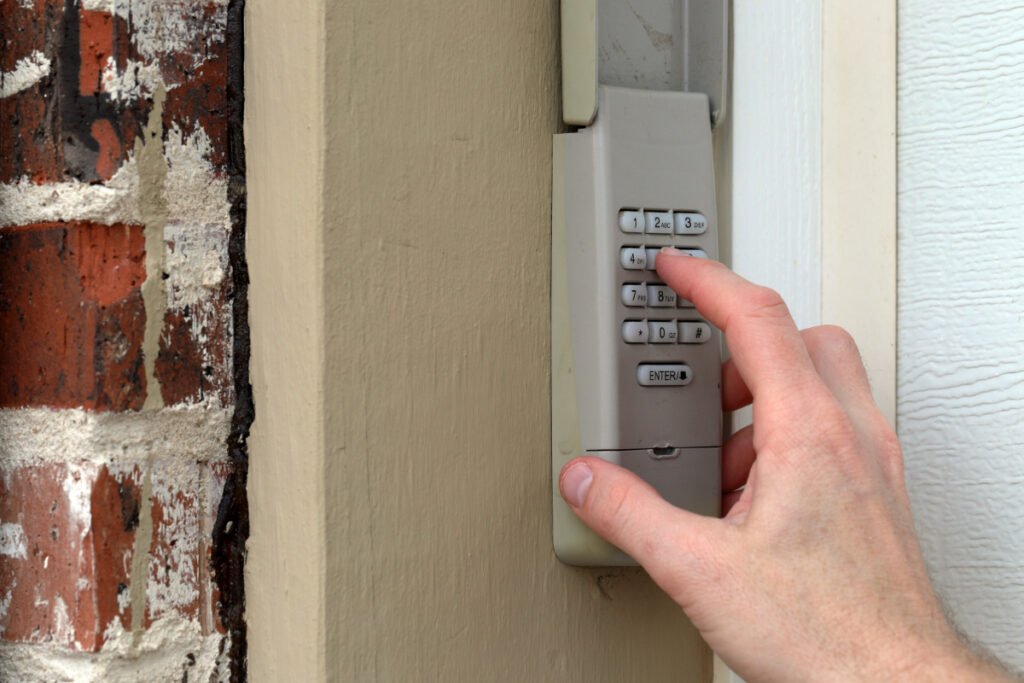
Keyless locks are the right tap for automatic garage door openers and operate entirely on a keypad and entry code with a unique password. These are mounted near the door handle and operate on remotes, fingerprints, pin codes, and passwords instead of a lock and key. Plus, these bolts have sturdier mechanical gear, making them difficult to break or force open.
Best Preferred For: Any carriage door, sectional door, side-hinged door, or roll-up door.
| Average Cost | $150 – $250 |
| Prominent Material | Zinc or Powder Coated Metal |
Pros:
- Eliminates the use of keys and operates on a single click.
- Can be locked and unlocked from anywhere.
- Can have multiple locking points and bolts.
- Can be combined with the alarm sensors.
Cons:
- Difficult to install and need professional help.
- Doesn’t have an extended warranty.
Comparison of Garage Locks at a Glance
| Parameter | Slide | T handle | Automatic | Central | Electronic | Defender | Keyless |
| Cost | Low | Low | High | Moderate | Moderate | High | High |
| Operation | Manual | Manual | Digital | Manual | Digital | Manual | Digital |
| Weatherproof | High | Moderate | Low | High | Low | High | Low |
| Strength | Moderate | Moderate | High | High | High | High | High |
| Increase Home Resale Value | No | No | Yes | No | Yes | Yes | Yes |
| Side of Mounting | Internal | Both | External | Both | External | External | External |
Tips for Choosing a Secure Garage Door Locks
- Analyze the Level of Garage Security: Analyze the value of items and belongings in your garage and pick stronger door defenders or automatic locks if you have heavy machinery or expensive tools. And, you can pick simple sliding locks for a vehicular garage.
- Consider the Warranty: Manufacturers offer the highest warranty for T handle and automated lock kits. Hence, you could pick those if you live in humid regions where the locks are prone to corrosion and weathering.
- Consider your Garage Door: Pick a manual lock if you have a traditional, side-hinged door and limit automatic locks for similar electronic and automated doors.
How to Maintain Garage Door Locks
- Periodically check and tighten all the loose installation screws and hardware to improve lock strength and force resistance.
- Always wipe all the dirt and debris around the bolts, latches, and tracks for a smooth mechanism and functioning.
- Lubricate the locks annually with any dry lube tubes to reduce friction and keep them in good condition.
- Rinse all the sliding locks, bolts, and latches with an anti-rust solution to prevent corrosion.
- Never operate the opener if the garage door block is bolted in place.
- You can add a deadbolt lock to enhance the garage door security from the outside.
What Is the Strongest Lock for a Garage Door?
Garage door defenders are the strongest locks for any type of garage door. They are ground-mounted and come with a huge padlock that prevents tampering. Moreover, they are pretty hefty and can be clubbed with any other sliding lock for added security.
Can Garage Door Locks Be Replaced?
Yes, anyone can replace a garage door lock with the help of a drill and a lock installation diagram that tells you each lock’s screwing, wiring, and mechanism. Or, you can simply buy a lock kit and follow their instructions. However, it’s advisable to seek professional help.
Can You Rekey the Garage Door Locks?
Yes, you can rekey garage door locks with the help of any locksmith services that charge you about $100 – 200 for the same. They’ll change and set the pins without modifying the whole garage door.
How Much Does It Cost to Replace a Garage Door Lock?
Locksmith services usually charge about $90 – 400 to replace a lock, based on its type, the thickness of the door, mounting, and additional maintenance.
Can Someone Else Remote Open My Garage Door?
Yes, someone can open your garage door if you lose or misplace the remote and have no other way to control it. In fact, your neighbors can operate your garage door if they have a remote that matches the frequency of your opener. So, it’s better to add an external deadbolt or use a defender to prevent faulty door operations and usage.
Garage door locks are a must for homes with attached garages to prevent thefts and breakdowns. But did you know you can also replace your entire garage door and use an alternative? Well, find out the most cost-effective and best garage door alternatives in my next guide!

